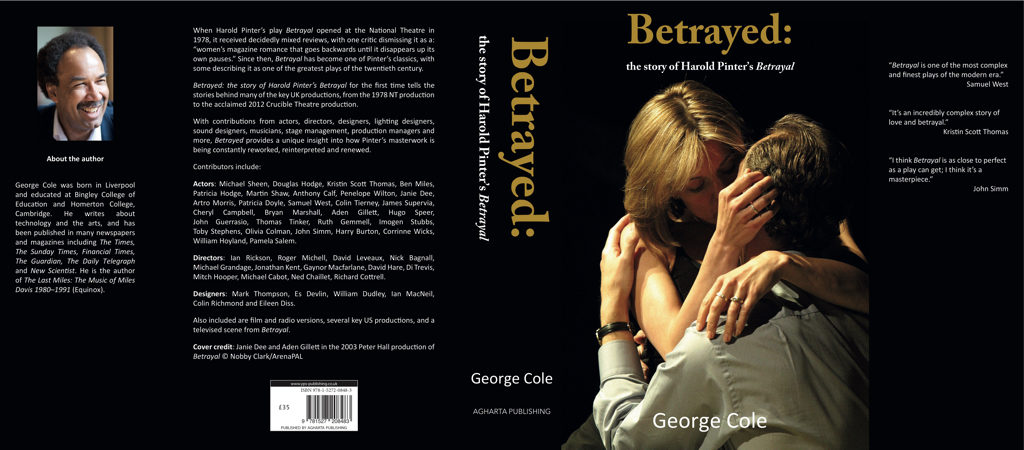The first in-depth look at Harold Pinter’s masterpiece.
- 285,000 words, almost 800 pages
- 741 pages of text, plus 48 pages with more than 90 colour and black and white images, many from personal collections and never published before
- Photographs from the archives of professional photographers, and dozens of images from top photo agencies.
Hardback 500-copy print run. £35 per copy.
Published by Agharta Publishing.
ISBN: 978-1-5272-0848-3
Publication Date: 1 June 2019
Betrayed is available now (£35 +pp) from the online bookshop of York Publishing Services.
Betrayed is now also available to purchase from Amazon.co.uk & Waterstones.

“Betrayal is one of the most complex and finest plays of the modern era.” Samuel West
“It’s an incredibly complex story of love and betrayal.”
Kristin Scott Thomas
“I think Betrayal is as close to perfect as a play can get; I think it’s a masterpiece.” John Simm
When Harold Pinter’s play Betrayal opened at the National Theatre in 1978, it received decidedly mixed reviews, with one critic dismissing it as a: “Women’s magazine romance that goes backwards until it disappears up its own pauses.” Since then, Betrayal has become one of Pinter’s classics, with some describing it as one of the greatest plays of the twentieth century.
Betrayed – the story of Harold Pinter’s Betrayal for the first time tells the stories behind many key UK productions, from the opening 1978 National Theatre production to the acclaimed 2012 Crucible Theatre production.
With contributions from more than 100 actors, directors, designers, lighting designers, sound designers, composers, costume designers, stage management, production managers and more, Betrayed provides a unique insight into how Pinter’s masterwork is constantly being reworked, reinterpreted and renewed.
Also included are the stories behind the film and radio versions, Broadway productions, and a televised scene from Betrayal.
Contributors include:
Actors: Julien Ball; Harry Burton; Anthony Calf; Cheryl Campbell; Mark Carey; Olivia Colman; Janie Dee; Paul Di Rollo; Patricia Doyle; Carol Drinkwater; Ruth Gemmell; Aden Gillett, Stefano Gressieux; John Guerrasio; Douglas Hodge; Patricia Hodge; William Hoyland; Bryan Marshall, Ben Miles; Artro Morris; Pamela Salem; Kristin Scott Thomas; Martin Shaw; Michael Sheen; John Simm; Hugo Speer; Toby Stephens; Imogen Stubbs; James Supervia; Colin Tierney; Thomas Tinker; Arturo Venegas; Samuel West; Corrinne Wicks and Penelope Wilton.
Directors: Nick Bagnall; Michael Cabot; Ned Chaillet; Richard Cottrell; Michael Grandage; David Hare; Mitch Hooper; Jonathan Kent; David Leveaux; Gaynor Macfarlane; Roger Michell; Ian Rickson and Di Trevis.
Associate Directors: Sasha Milavic Davies and Thea Sharrock.
Designers: Es Devlin; Eileen Diss; William Dudley; Ian MacNeil; Colin Richmond and Mark Thompson. Elizabeth Bury, wife of the late John Bury, and Micheline Gunter, wife of the late John Gunter, also talk about their husbands’ work.
Lighting Designers: Rick Fisher; Brian MacDevitt; Peter Mumford; and Johanna Town.
Sound Designers: Alex Baranowski; Gregory Clarke; Ian Dickinson; Alastair Goolden; Ric Green; Paul Groothuis and John Leonard.
Video designer: Chris Laing.
Video Editor: Bob Cassidy.
Costume Designers: Edward K. Gibbon and Jane Robinson.
Stage management: Catherine Bailey; Cath Booth; Lizzie Frankl; Chris Jacobs; Kate McDowell; Alison Rankin; Donna Reeves; Karen Stone.
Composers: Alex Baranowski; Alec Dankworth; Roger Eno; Jonty Harrison; Mike Moran; Dominic Muldowney and Stephen Warbeck.
Musicians: John Harle and Paul Higgs.
Production Managers: Mark Dakin and Rodger Hulley.
Voice coach: Patsy Rodenburg.
National Theatre staff during the 1978 production: Alan Ayres; Jules Boardman; John Goodwin; Lyn Haill and Michael Mayhew.
Set Manufacturers: Matthew Genner (Weld-Fab Stage Engineering) and Simon Kenny (Souvenir Scenic Studios).
Film Editor: John Bloom.
Unit stills photographer: Graham Attwood.
Equity general secretary: Peter Plouviez
Critics: Michael Billington; Ben Brantley; Edward Lucie-Smith and Gillian Reynolds.
About the author:
George Cole was born in Liverpool and educated at Bingley College of Education and Homerton College, Cambridge. He writes about technology and the arts, and has been published in many newspapers and magazines including The Times, The Sunday Times, Financial Times, The Guardian, The Daily Telegraph and New Scientist. He is the author of The Last Miles: The Music of Miles Davis 1980–1991 (Equinox).